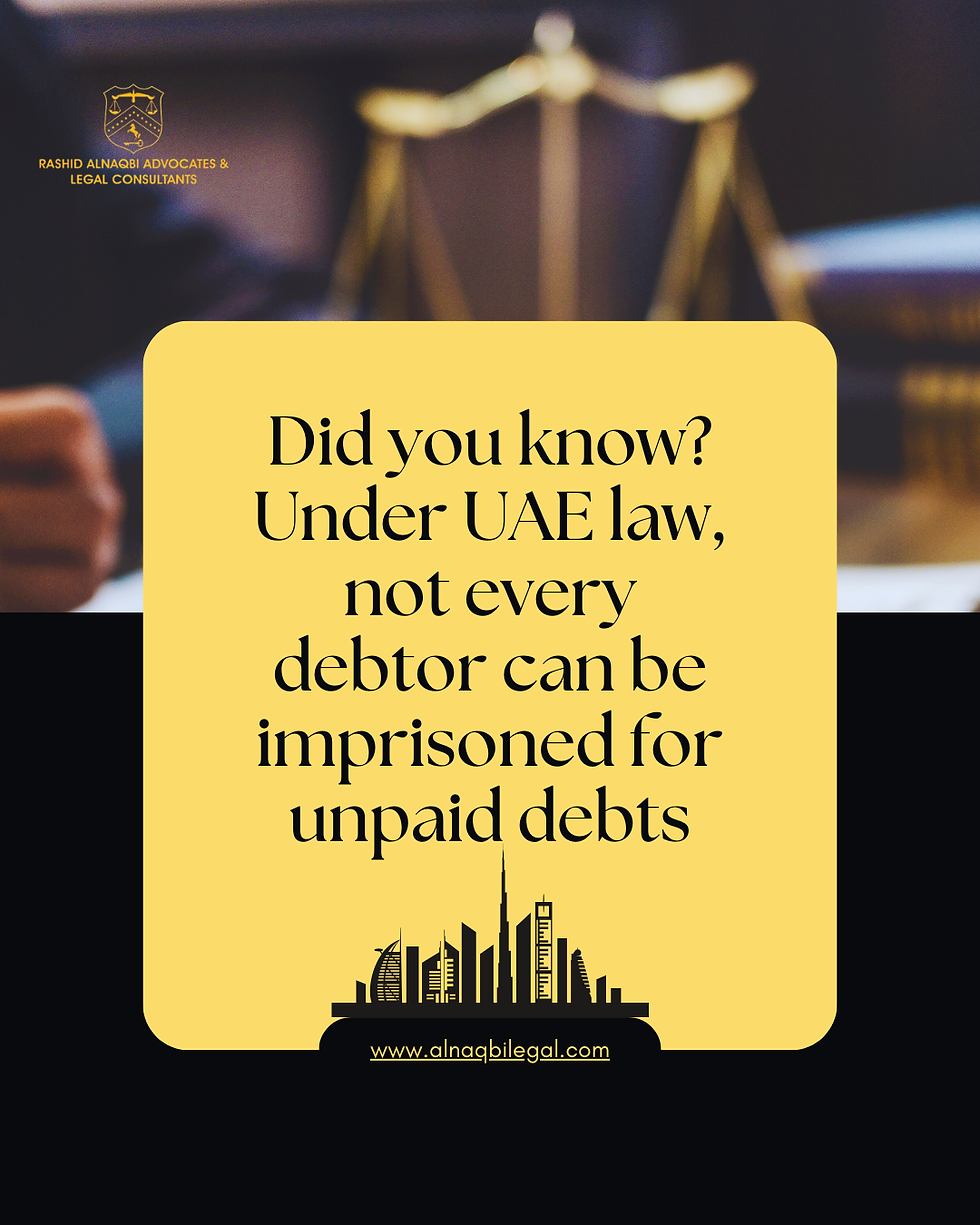Debt Imprisonment in Dubai: Key Exceptions under Article 321 of the UAE Civil Procedure Law
- abdelrahman abobakr
- Aug 22
- 2 min read
Updated: Aug 26

Legal Insights from Article 321 of the UAE Civil Procedure Law
When it comes to debt enforcement in Dubai and the wider UAE, one of the most frequently asked questions is: Can a debtor be imprisoned for non-payment of debts?
The answer is yes, but not always. The UAE Civil Procedure Law (Federal Decree-Law No. 42 of 2022) sets important restrictions on the imprisonment of debtors. Article 321 provides clear exceptions where detention cannot be applied, ensuring a fair balance between the rights of creditors and the dignity of debtors
What is Article 321 of the UAE Civil Procedure Law?
Article 321 outlines specific situations in which a debtor cannot be imprisoned despite having unpaid debts. These exceptions reflect humanitarian, social, and legal considerations designed to prevent unjust deprivation of liberty
Cases Where a Debtor Cannot Be Imprisoned in Dubai
Age Restrictions
No imprisonment if the debtor is under 18 years or above 70 years
Parental Responsibility
If the debtor has a child under 15 years old, and the other parent is deceased or already in prison
Family Relationships with the Creditor
A debtor cannot be imprisoned if they are the spouse or parent of the creditor, unless the debt is related to alimony (maintenance)
Financial Guarantees or Assets
If the debtor provides a bank guarantee or a financially capable guarantor accepted by the enforcement judge, Or if the debtor declares sufficient assets within the UAE that can cover the debt
Medical Conditions
If certified medical evidence proves the debtor suffers from a chronic, incurable illness that makes imprisonment unbearable
Small-Value Debts
Imprisonment is not allowed if the debt is less than AED 10,000, except in cases of:
Court-imposed fines.
Alimony obligations.
Unpaid wages or employment-related dues.
Obligations to perform or refrain from an act
Why Does Dubai Law Restrict Debt Imprisonment?
The philosophy behind Article 321 is to ensure that imprisonment is not used as a routine tool for debt collection. Instead, the law emphasizes:
Human dignity – protecting minors, the elderly, and the sick.
Family stability – ensuring children are not left without parental support.
Proportionality – imprisonment only for serious debts or obligations.
Alternative enforcement – encouraging settlement through guarantees, asset execution, or financial arrangements
Practical Legal Implications for Creditors and Debtors in Dubai
For Creditors: Before requesting imprisonment, creditors must prove that none of the exceptions under Article 321 apply. They should also explore alternatives such as asset execution or obtaining bank guarantees.
For Debtors: Individuals who qualify under Article 321 can legally contest an imprisonment request by providing medical evidence, family documents, or proof of assets.
For Legal Practitioners: Lawyers must guide clients through both enforcement rights and humanitarian protections available under UAE law
Article 321 of the UAE Civil Procedure Law makes it clear: not every debtor can be imprisoned.
The law protects vulnerable individuals while still holding debtors accountable. This ensures that debt enforcement in Dubai aligns with both international standards and the UAE’s commitment to justice, fairness, and family stability




Comments